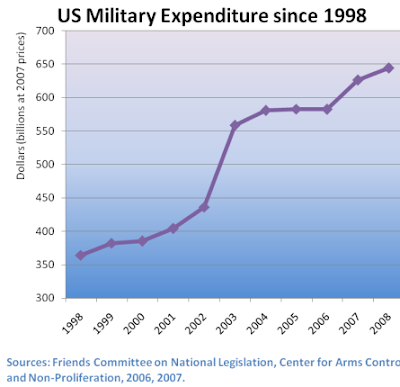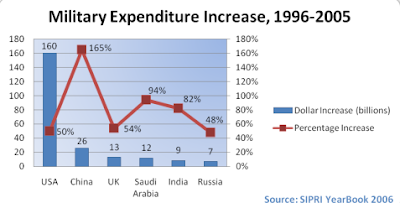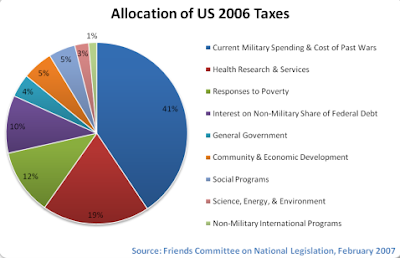Global Security has taken the Fiscal Year 2008 U.S. budget and prepared a new chart illustrating the most significant and under-discussed political fact in the United States, one that substantially affects every other issue:


Our military spending exceeds the rest of the world's spending combined, and we spend almost 10 times what the second-place country, China, spends. "Only" about $150 billion of the total U.S. amount is attributable to the two active wars we're fighting, in Iraq and Afghanistan. Thus, even if one wants to excludes those amounts, the basic picture remains the same. Nor do these amounts include the billions of dollars in military aid we give to fund the armies of other countries, such as Israel and Egypt, which alone comprise substantial portions of those countries' defense budgets.
And this gap between us and the rest of the world has widened considerably over the last 10 years. That's true because our own military spending, in absolute terms, has increased wildly during that time:
And it's also true because, even though we were already spending many times more than everyone else in the world during the mid-1990s, the explosion in our military spending over the last 10 years has far outpaced the rest of the world, resulting in a larger gap than ever before:
The complete absurdity of this state of affairs is self-evident, but is also acutely highlighted by this revealing statistic:
The US military budget was almost 29 times as large as the combined spending of the six "rogue" states (Cuba, Iran, Libya, North Korea, Sudan and Syria) who spent $14.65 billion.
In indisputable sum, we are the world's empire, in a state of permanent war readiness. In American politics and policy, there is no distinction between "peacetime" and "war." We're the most militarized country in the world by far, on permanent war footing, far beyond what anyone could ever remotely argue is necessary for "defense" or a "strong defense," no matter how broad a definition one wants to adopt for those terms.
Our permanent war culture not only means that we fight far more wars than anyone else, with far less of a threat required to trigger such wars, though that is true. It is also the case that the opportunity costs for this state of affairs are enormous:
Beyond that, it's been evident for some time that the country simply can't afford to sustain any of this.
Obviously, all of the leading Fox News Republican presidential candidates advocate a continuation and worsening of this state of affairs. And so do the leading Democratic presidential candidates (h/t Blue Texan):
Hillary Clinton:
To help our forces recover from Iraq and prepare them to confront the full range of twenty-first-century threats, I will work to expand and modernize the military so that fighting wars no longer comes at the expense of deployments for long-term deterrence, military readiness, or responses to urgent needs at home.
I will double the budget for recruitment and raise the standards for the recruitment pool so that we can reduce our reliance on felony waivers and other exceptions. In addition, I will increase our investment in the maintenance of our equipment for the safety of our troops.
To renew American leadership in the world, we must immediately begin working to revitalize our military. A strong military is, more than anything, necessary to sustain peace. . . .We must use this moment both to rebuild our military and to prepare it for the missions of the future. . . . We should expand our ground forces by adding 65,000 soldiers to the army and 27,000 marines. . . .
I will not hesitate to use force, unilaterally if necessary, to protect the American people or our vital interests whenever we are attacked or imminently threatened.
We must also consider using military force in circumstances beyond self-defense in order to provide for the common security that underpins global stability -- to support friends, participate in stability and reconstruction operations, or confront mass atrocities.
It is, of course, possible to argue that the U.S. should maintain the strongest military force in the world but that we need not spend more than the rest of the world combined, nor increase what we spend every year, yet those issues can't even be broached in good company. "Reducing defense spending" has become as much of a bipartisan, toxic position as "increasing taxes." They both can only go in one direction.
None of this is to suggest that there are no differences between the parties, etc. Plainly, there are, and -- as even Ralph Nader and Dennis Kucinich now seem to realize -- some of those differences are meaningful. Although one can only speculate, it seems highly unlikely, for instance, that a President Gore would have invaded Iraq or ushered in most of the repugnant abuses that have degraded every aspect of our country over the last 7 years. Even if those differences are piecemeal rather than fundamental, they still matter, and at times, they can matter a lot.
Nonetheless, it's still worth noting (as Matt Stoller recently documented) that despite all the incessant chatter about "change" and the intensity of election conflicts, our most significant, dubious policies -- the ones that actually shape what kind of country we are and how we are perceived around the world -- don't really get debated at all. Those who try to are quickly and widely dismissed as fringe, insane, angry, deranged "crazies."
It's a genuinely good thing that we continue to elect our leaders by voting, but one is remiss if one fails to take note of just how profoundly limited and lacking is the discourse that surrounds that process. There really is an almost complete, inverse relationship between a policy's significance and the level of debate to which it's subjected: that is, the more significant the policy is, the less political debate and media attention it receives. So not only do our most destructive policies continue regardless of the outcome of our elections, they continue without any real democratic deliberation at all.



Shares